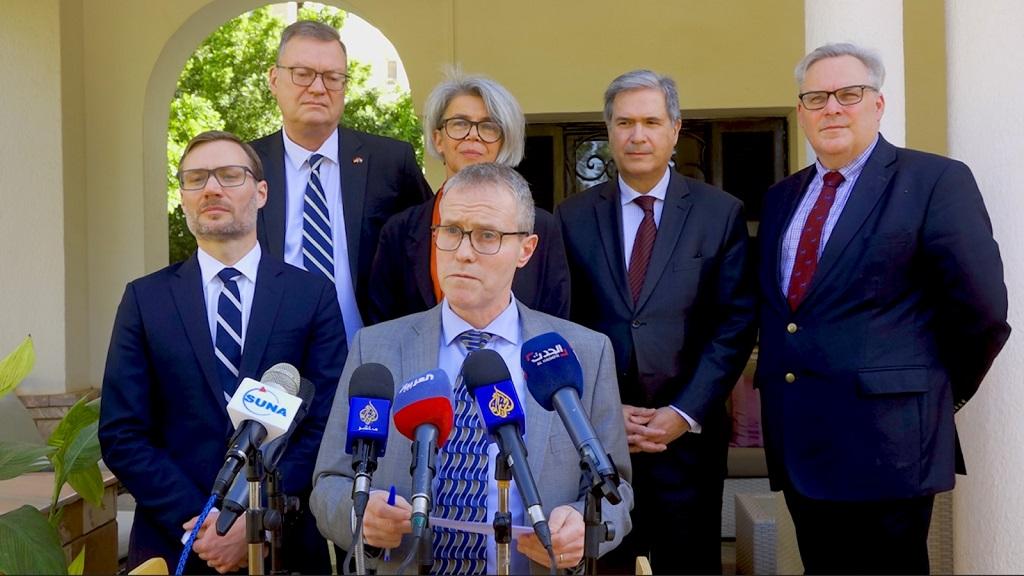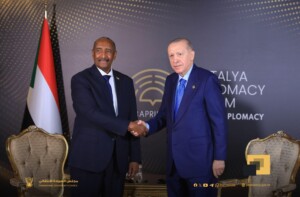Int’l envoys conclude Sudan visit: call for civilian leadership but discouraging ‘parallel processes’

The six international special envoys during their visit to Khartoum, February 8 (SUNA)
KHARTOUM – February 10, 2023
Special envoys from the United States of America, the European Union, the United Kingdom, Norway, France, and Germany concluded a joint visit to Khartoum with a call to resume civilian leadership for the transition to democracy and a reiteration of their support for the Framework Agreement.
The special envoys arrived on Tuesday and met with a range of Sudanese actors, including civilian signatories to the Framework Agreement, representatives from civil society organisations and resistance committees, signatories to the Juba Peace Agreement, and the military leadership.
In a press conference in Khartoum yesterday, they urged the Sudanese parties to conduct a comprehensive dialogue on the basis of the Framework Agreement, work to address the root causes of the conflict, and build a stable and prosperous Sudan.
“We urge the parties to deepen and expand their commitment to inclusivity and bring together women, youth, and representatives from all over Sudan to participate in shaping their country’s future,” the envoys said in their joint statement.
The special envoys reiterated their support for the Framework Agreement, which caused resistance committees to demonstrate during the envoys’ visit. “The Framework Political Agreement process remains in our view the best basis on which to form a civilian-led transitional government and establish constitutional arrangements for a transitional period that culminates in elections,” the statement read.
‘The Framework Political Agreement process remains in our view the best basis on which to form a civilian-led transitional government’
The Framework Agreement signed last year has been the result of negotiations between Sudan’s military authorities, who took power in a coup, and a civilian coalition led by the mainstream Forces for Freedom and Change-Central Council (FFC-CC).
The parties are still negotiating on some ’thorny’ issues that will be included in a Final Agreement. Possible impunity for military leaders has been a very contentious issue in the ongoing negotiations.
“It is our strong hope that the parties will make a concerted effort to finalise negotiations and reach Final Agreement quickly to form a civilian-led transitional government to address Sudan’s urgent political, economic, security, and humanitarian challenges.”
“Recognising the fragility of democratic transitions, we stand united in promoting accountability for those, including either military, armed group, or civilian actors, who attempt to undermine or delay Sudan’s transition to democracy,” the statement read as well.
No parallel processes
“The Special Envoys and representatives strongly discouraged parallel processes,” the statement continued, referring to the Egyptian initiative for an inter-Sudanese dialogue that has the support of groups who are unhappy about the Framework Agreement.
‘The Special Envoys and representatives strongly discouraged parallel processes’
At the conclusion of the six-day Cairo dialogue conference initiated by the Egyptian government, the participants signed the Political Accordance Document which is to be the governing document for the upcoming transitional period, instead of the Final Agreement.
Convince holdout parties
Khaled Omar Yousef, who was Minister of Cabinet Affairs during the government of PM Abdallah Hamdok (2019-2021) and is currently the official spokesman for the political process that is to lead to a new civilian government of technocrats, said in a press statement yesterday that efforts will be exerted to convince important holdout parties to sign the Framework Agreement.
The Sudan Quartet (USA, UK, Saudi Arabia and UAE) have proposed to hold a meeting between Sudan’s military government leaders, Lt Gen Abdelfattah El Burhan and Lt Gen Mohamed Hamdan ‘Hemeti’ Dagalo, and representatives of the civilian forces that reject the Framework Agreement.
The latter group includes current Finance Minister Jibril Ibrahim, also the leader of the Justice and Equality Movement (JEM), leader of a Sudan Liberation Movement split-off faction (SLM-MM) and Governor of Darfur Minni Minawi, and Jaafar El Mirghani, the vice-president of the mainstream Democratic Unionist Party (DUP).
The three parties are members of the Forces for Freedom and Change-Democratic Block (FFC-DB) formed in November last year and took part in the Egyptian initiative.
Representatives of the Quartet and the AU-IGAD-UNITAMS Trilateral Mechanism brokering the negotiations between the military junta and the civilian opposition under the leadership of the FFC-CC will attend the meeting.
Yousef said that the meeting aims to discuss ways for the holdout groups to join the ongoing political process in order to reach a final political agreement together that restores the path of civil democratic transition.
The FFC-CC, however, refuses to accept the FFC-DB as a partner in the Framework Agreement. In a statement two months ago, the FFC-CC said that the Block is not interested in democracy and indicated that the only parties entitled to sign from the FFC-DB have been previously agreed upon, namely JEM and SLM-MM.
The statement sparked criticism and the FFC-CC’s Framework Agreement was called ‘exclusionary and weak’.











 and then
and then